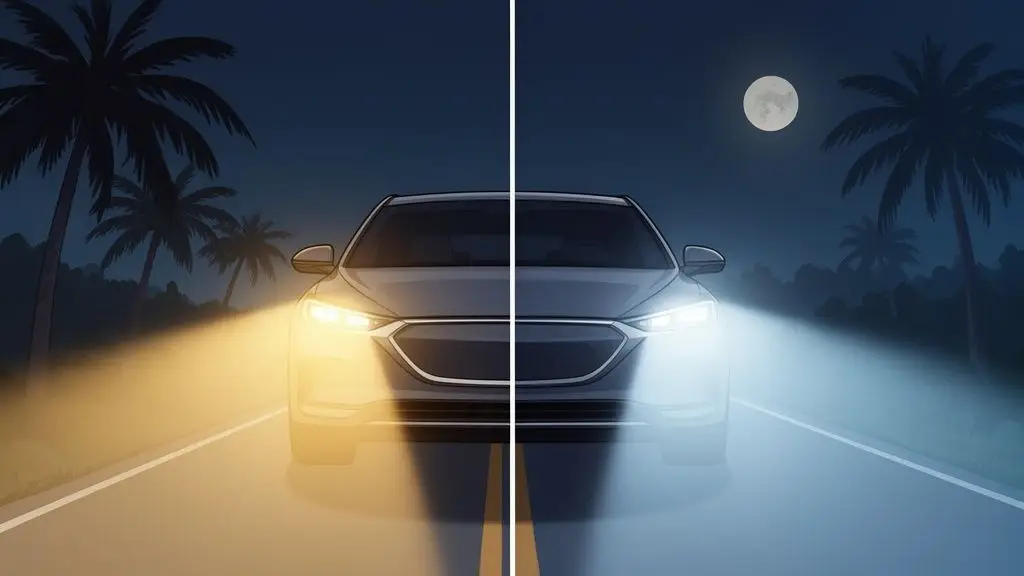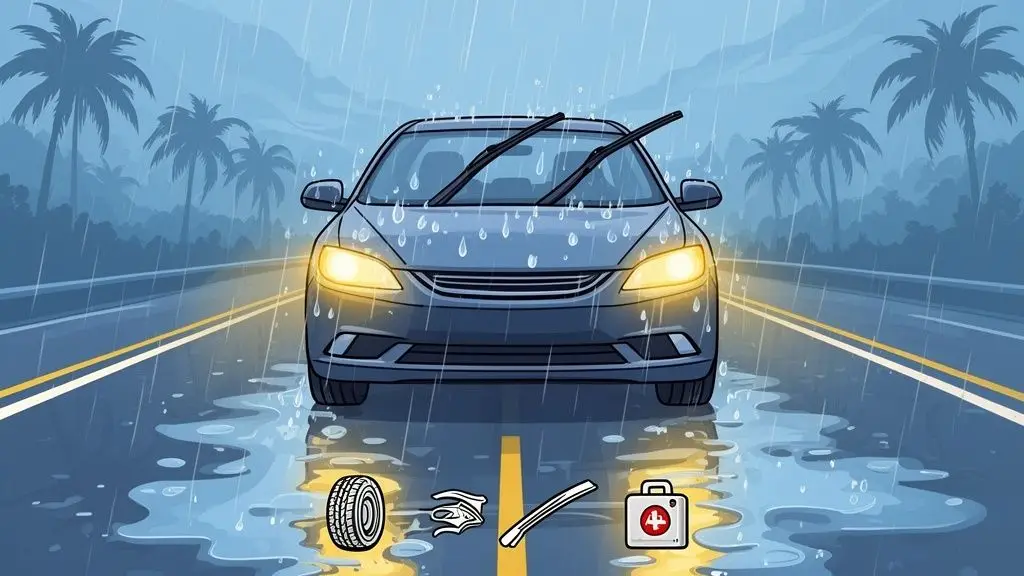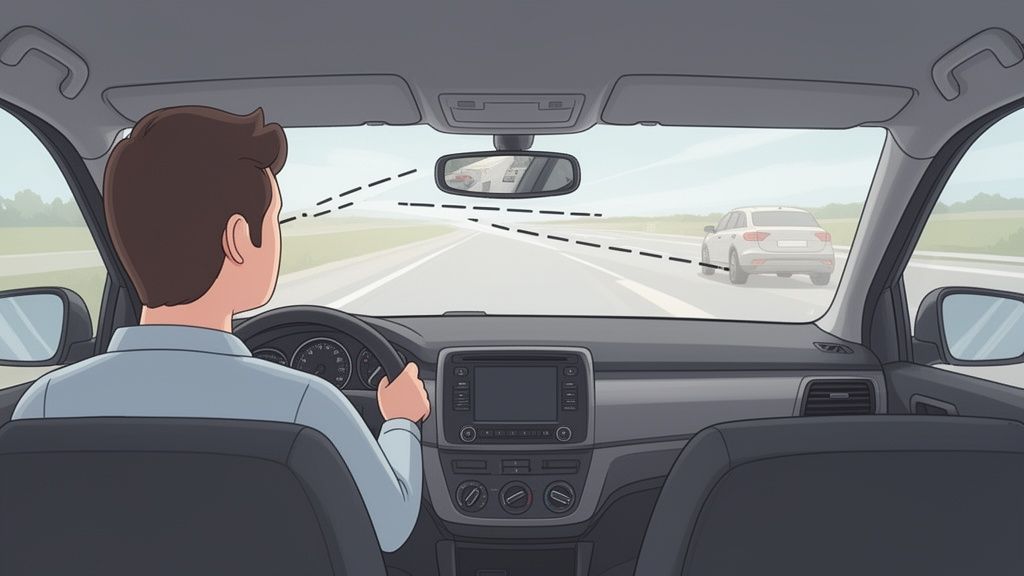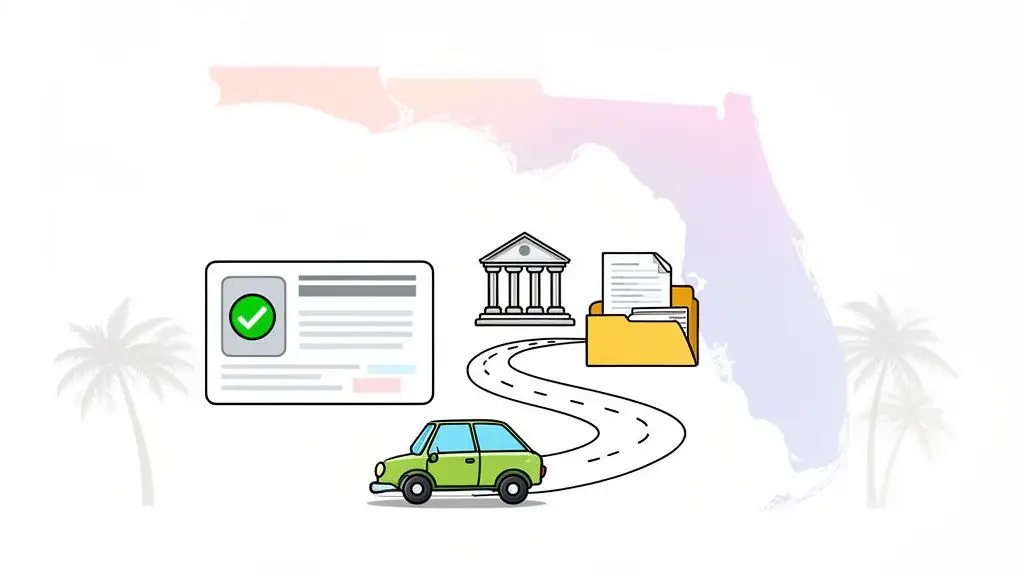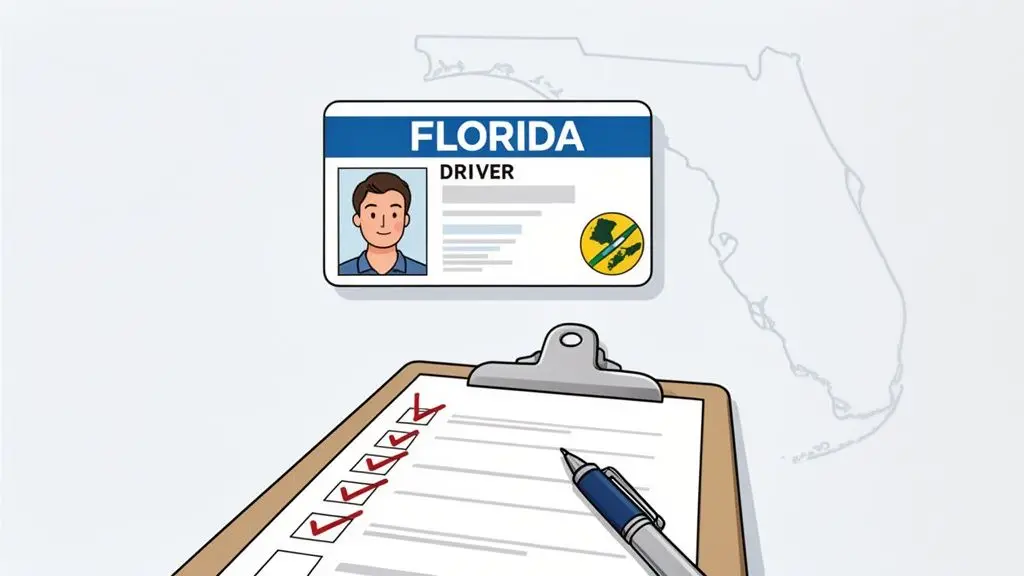So, you got a ticket in Florida and now you’re wondering, “How much is traffic school going to set me back?” Let’s break it down.
On average, you can expect the base traffic school cost for a standard 4-hour Basic Driver Improvement (BDI) course to land somewhere between $15 and $32. But don’t let that super-low number fool you—it’s rarely the final price you’ll pay.
What Is the Average Cost of Florida Traffic School

When you see a traffic school advertising a course for less than the price of lunch, it’s smart to be a little skeptical. Think of it like booking a flight on a budget airline. That initial ticket price looks fantastic, but by the time you’ve paid for your seat, a carry-on, and a checked bag, the total is a lot different.
Traffic school pricing works the same way. The advertised fee gets you in the door and covers the basic, state-approved course material. Your final bill, however, will almost always be higher once you factor in mandatory state fees and any optional services you might add at checkout.
The real takeaway here is to budget for more than just the flashy number on the homepage. While a low traffic school cost grabs your attention, your final payment will likely be closer to the $25 to $40 range once everything is said and done.
This “base price plus add-ons” model is standard practice across Florida. But honestly, it’s a small price to pay when you look at the bigger picture. Compare it to comprehensive driver’s ed in the U.S., which averages a whopping $937 per person. Suddenly, a BDI course seems pretty reasonable, right?
To get a better handle on what you might actually pay, let’s look at a quick summary of the common costs involved.
Florida Traffic School Cost Breakdown At A Glance
Here’s a snapshot of the typical costs you’ll encounter when signing up for a 4-hour BDI course in Florida.
| Cost Component | Typical Price Range |
|---|---|
| Base Course Fee | $8 – $30 |
| State Assessment Fee | $3 – $5 |
| Certificate Processing | $10 – $20 |
| Audio Read-Along | $5 – $10 |
| Instant Certificate | $10 – $15 |
Knowing these potential charges upfront helps you avoid any surprises when you get to the payment page. For a deeper dive into provider-specific features and pricing, you can check out our guide on finding the best online traffic school to see how different options stack up.
Understanding What Drives Your Final Price Tag

If you’ve started shopping around for traffic school, you’ve probably noticed the traffic school cost can vary quite a bit. It’s a lot like buying a concert ticket. There’s a base price to get in the door, but the final amount on your receipt can change based on your seat, service fees, and any VIP perks you add. Several key factors are at play when it comes to what you’ll ultimately pay.
The biggest difference usually comes down to the course format. A traditional, in-person classroom course is almost always going to cost more. They have to cover expenses like rent for the space and paying an instructor. Online traffic schools, on the other hand, have much lower overhead, so they can pass those savings on to you with a more affordable starting price.
Course Type and Duration
The specific course you’ve been ordered to take is another huge piece of the pricing puzzle. Florida’s courts don’t treat every traffic violation the same, so the required training varies, and the course length is directly tied to the cost. As you’d expect, longer, more involved courses come with a higher price tag.
- 4-Hour Basic Driver Improvement (BDI): This is the go-to course for most minor moving violations and is the most common—and cheapest—option out there.
- 8-Hour Intermediate Driver Improvement (IDI): If a judge ordered your traffic school, it might be for this more in-depth course, which costs more than the standard BDI.
- 12-Hour Advanced Driver Improvement (ADI): This is the most extensive and expensive course, typically reserved for drivers with a suspended license or multiple serious offenses.
No matter which course you need, it’s critical to pick an approved online traffic school to make sure the court will accept your completion certificate.
Provider Features and Support
Finally, the school you choose makes a difference. Some providers focus on being the absolute cheapest, offering a very basic, no-frills, text-based course. Others might charge a little more but give you a better experience with features like video lessons, 24/7 customer support, and a modern, easy-to-use website.
The price often reflects the level of convenience and support you receive. A slightly higher fee might be worth it for a smoother, more engaging educational experience.
The driver education market is expanding rapidly. Projections show it could grow into a $12.28 billion industry by 2033, a massive leap from $6.306 billion in 2025. For you, this growth means more schools and more options to choose from.
Seeing Past the Sticker Price: Hidden Fees and Optional Upgrades
That super-low price you see advertised for an online traffic school? It’s often just the tip of the iceberg. Think of it like booking a budget airline ticket—the base fare looks great, but the final cost can creep up once you start adding extras like a better seat or a carry-on bag. Your total traffic school cost works the same way, with a bunch of optional upgrades popping up right before you pay.
These add-ons are all about convenience, but they’re rarely essential for getting your ticket dismissed. Schools will offer services that promise to make the course easier or get your certificate to you faster. Knowing what they are ahead of time is the best way to keep your final bill from giving you sticker shock.
What Are These Common Add-Ons Anyway?
Traffic schools are pretty good at making these upgrades sound like a must-have, but let’s be clear: they are 100% optional. You don’t need to buy a single one to successfully complete the course and satisfy the court. The decision really boils down to your budget, how you like to learn, and whether your deadline is right around the corner.
This infographic breaks down the typical price range for the most common bells and whistles you’ll be offered.
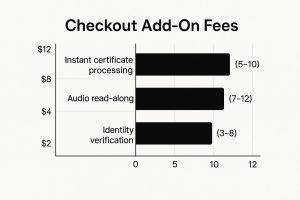
As you can see, the audio read-along feature is usually the priciest add-on, while extra identity verification options are often the cheapest.
So, what do these things actually do? Here’s a quick rundown to help you decide if they’re worth the extra cash for you.
- Audio Read-Along: This turns the entire course into an audiobook. It’s a great option if you learn better by listening or want to chip away at the material while driving or doing chores.
- Instant Certificate Processing: Standard processing and emailing your certificate might take a day or two. This upgrade jumps you to the front of the line, sending the certificate to your inbox the moment you pass the final exam. It can be a lifesaver if your court deadline is looming.
- Identity Security Verification: While every school includes the state-required security questions for free, some offer fancier ways to prove you’re you. This is purely for a slightly smoother login experience.
Here’s the bottom line: You can get through traffic school just fine without purchasing any of these upgrades. They are tools for convenience, not requirements for completion. If you’re smart about what you click on, you can make sure that great low price you found is the price you actually pay.
Comparing Budget, Mid-Range, and Premium Schools
When you start shopping around for a Florida traffic school, you’ll quickly notice the prices are all over the map. What gives? Well, the traffic school cost is a pretty good indicator of the experience you’re about to have. It’s kind of like booking a flight—you can go with a bare-bones budget airline or pay a bit more for comfort and better service.
Every state-approved course will get the job done and help you handle your ticket. But how you get from start to finish can feel worlds apart depending on what you’re willing to spend. Let’s break down what your money actually gets you.
The Budget Tier: Under $10
Think of these schools as the no-frills option. They deliver the absolute bare minimum required by the state, and that’s it. You’ll find the course is almost always entirely text-based, which means you’ll be doing a lot of reading on a website that might look like it hasn’t been updated since the early 2000s.
- What you get: A fully approved course that satisfies all the legal requirements for dismissing your ticket.
- What you don’t get: Engaging videos, interactive content, a modern design, or round-the-clock customer support.
If your only mission is to check this box for the lowest possible price, this tier is for you. Just be ready for a straightforward, self-serve experience where you’re pretty much on your own if you hit a snag.
Mid-Range and Premium Tiers: $10 and Up
Once you cross that $10 threshold, the quality and features start to improve slowly. Mid-range schools, which usually fall in the $10-$20 range, often have a more polished website and some better customer service hours.
Go for a premium school—typically $25 and up—and you’re paying for the smoothest experience possible.
These providers really invest in making the course less of a chore. We’re talking professionally produced videos, interactive quizzes, and full support you can actually reach by phone or email.
This is where you see a real difference in the experience, which can make the whole process feel a lot less painful.
Comparing Traffic School Tiers: Budget vs. Premium
So, what do those extra few dollars really buy you? This table breaks down the common features you’ll find at each price point, helping you see where the real value is for your specific needs.
| Feature | Budget Tier (Under $10) | Mid-Range Tier ($10-$20) | Premium Tier ($20+) |
|---|---|---|---|
| Course Content | Text-only format | Mix of text and graphics | Video-based & interactive |
| Customer Support | Email only, limited hours | Extended hours, chat/email | 24/7 phone, chat & email |
| User Experience | Basic, dated interface | Modern, user-friendly site | Polished, mobile-optimized |
Ultimately, the right choice comes down to what you value most. If you want an easy, engaging process with a safety net of great support, spending a little extra on a mid-range or premium school is almost always a smart move.
Actionable Tips to Lower Your Traffic School Cost

Now that you know how the pricing works, let’s talk about actually cutting down your traffic school cost. With a few savvy moves, you can find a great deal without settling for a low-quality course that the court might reject.
Think of it like shopping for anything else—you wouldn’t pay full price if you knew a coupon was out there. The same goes for traffic school. A quick search for the school’s name plus “promo code” before you hit the checkout button can often knock a few bucks off the price.
Another thing to look for is package deals. Many schools bundle the course with other necessities, like a certified copy of your Florida driving record. Since you have to submit that record to the court anyway, buying it as part of a bundle is often cheaper than getting it directly from the state later on.
Frame the Cost as a Smart Investment
While saving money upfront is great, it’s important to see this fee for what it really is: a smart financial move. That small course fee is your ticket to avoiding a much bigger, ongoing expense—a spike in your car insurance rates. Just one ticket can jack up your premiums for three years or more.
Think about it: Paying a $25 traffic school fee to sidestep a $300 annual insurance increase is an obvious win. Over three years, that one-time payment could save you close to $900.
The global driving school market is massive—valued at $98.71 billion in 2024—and it’s only getting bigger. For you, that growing competition is a good thing. It means more schools are vying for your business, which leads to better prices and more options.
Final Checks Before You Buy
Before you pull the trigger, do one last thing: scan recent customer reviews for any mention of hidden fees. This is a five-minute check that can save you a lot of frustration by helping you avoid schools that surprise you with extra charges at the last minute.
By using these simple strategies, you can find a court-approved course that doesn’t break the bank. If your main goal is simply to find the rock-bottom price, starting your search for the lowest price traffic school in Florida is a surefire way to meet the court’s requirements without overspending.
Finishing your traffic school course is a great feeling, like you’ve just crossed the finish line. But hold on—there’s one more crucial step to take before you can truly celebrate.
This final part of the process involves the court, and it’s totally separate from the traffic school cost you already paid. It’s a common point of confusion, so let’s be clear: your course fee pays for the education, not the ticket itself.
Think of it like this: you paid the school for the class, and now you have to settle up with the court to officially put the ticket behind you. The original fine and any administrative fees tied to your ticket are still due, and you’ll pay them directly to the Clerk of Court in the county where you got pulled over.
Your Post-Course Checklist
To make sure all your effort wasn’t for nothing, you have to get your completion certificate into the right hands. If you skip this, the court will never know you finished the course, and that ticket could pop right back onto your record.
Follow these simple steps to make sure your case is closed out correctly:
- Get Your Certificate: As soon as you pass the final exam, the traffic school sends you a certificate of completion. Depending on what you picked during sign-up, it might land in your email inbox instantly or show up in your mailbox a few days later.
- File it with the Court: It’s your job to get this certificate to the Clerk of Court for the county that issued the ticket. Every county is a little different, so check their website. Some let you upload it online, while others might require you to mail it or drop it off in person.
- Pay Your Dues: Settle any remaining ticket fines and court fees. Remember, this payment goes straight to the county, not the traffic school.
- Confirm Everything: Give it a week or two, then circle back with the Clerk of Court. A quick call or email to confirm they received your certificate and closed your case is all it takes for total peace of mind.
Following this process ensures you get full credit for your work, your ticket gets dismissed, and you avoid any nasty surprises down the road. For more tips on navigating the system, check out our guide on traffic court advice.
Alright, let’s tackle some of the most common questions that pop up when you’re staring down a traffic ticket and trying to figure out the real cost.
Can I Trust the Cheapest Online School?
It’s a fair question. The short answer is yes, as long as the school is officially approved by the Florida Department of Highway Safety and Motor Vehicles (FLHSMV). Any state-approved course, even the rock-bottom cheapest one, will satisfy the court’s requirements and help you get that ticket handled.
The real difference comes down to the experience. Budget-friendly courses are often no-frills—think walls of text and basic email support. The more you pay, the more you tend to get, like engaging video lessons, interactive content, and round-the-clock customer service.
Do I Still Have to Pay the Fine for the Ticket?
This is a big one, and it trips a lot of people up. Yes, you absolutely still have to pay the ticket fine.
Think of it this way: the traffic school fee is what you pay the school for the course itself. The ticket fine is what you pay the Clerk of Court for the actual violation. Completing the course is the step that keeps the points off your license, but it doesn’t erase the fine.
Remember, paying the course fee does not pay your ticket. These are two distinct and required payments to fully resolve your citation and protect your driving record.
The court and administrative fees tied to your ticket can run anywhere from $100 to $150, though this can change quite a bit depending on which county you’re in.
Ready to handle your ticket with a straightforward, state-approved course? At BDISchool, we make the process simple and affordable. Enroll today and get back on the road with confidence!
